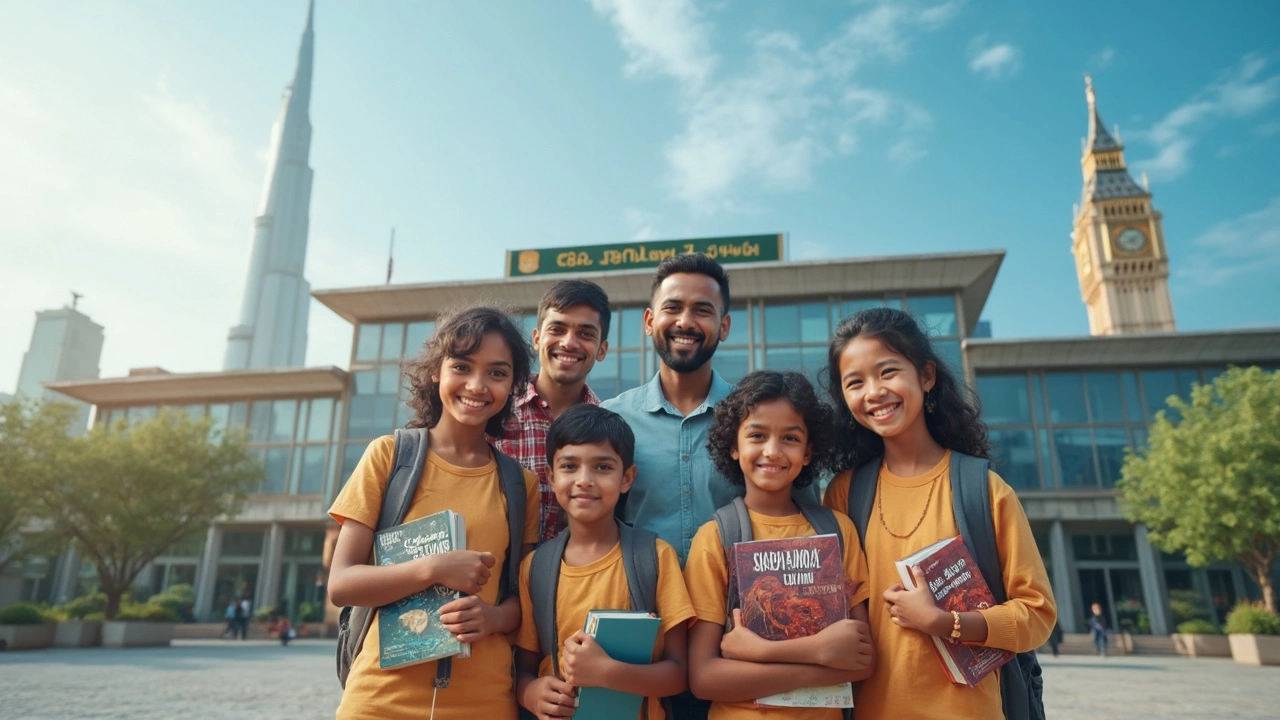Seeing CBSE schools pop up in places like Dubai, Singapore, and even Tokyo is not as rare as people think. There are hundreds of schools outside India using the CBSE syllabus, and it isn’t just for Indian expat kids. In some international cities, you’ll find students from Pakistan, Bangladesh, and other countries choosing CBSE because it keeps doors open for higher education in India.
The big reason: moving abroad for work shouldn’t mean a total switch-up in your kid’s education. If you’re a parent like me, with kids changing countries every few years, having CBSE schools nearby means your child can pick up right where they left off. Even little details—like the same science textbooks and familiar languages—make the move a lot less stressful.
- CBSE Spreads Beyond Borders
- Countries with CBSE Schools
- Why Families Choose CBSE Abroad
- Adapting to Life in a Global CBSE Classroom
CBSE Spreads Beyond Borders
Most people are surprised to learn that the CBSE abroad network actually exists in more than 25 countries. This isn’t some random experiment—schools overseas follow the Central Board of Secondary Education standards with official approval from India. Many of these schools even get routine checks by CBSE to make sure everything is legit, from exams to teacher training.
Why does CBSE have such strong roots outside India? The simple reason: demand. With so many Indians living and working in other countries, parents wanted their kids to learn the same things as back home. That’s how you end up with CBSE schools in places you wouldn’t expect, like Russia, Kenya, Japan, and the Middle East.
Here’s a snapshot of the reach:
| Country | No. of CBSE Schools (2024) |
|---|---|
| UAE | 78 |
| Saudi Arabia | 10 |
| Singapore | 3 |
| Oman | 21 |
| Qatar | 8 |
| Kuwait | 19 |
| Bahrain | 3 |
| Japan | 2 |
| Russia | 1 |
| Nepal | 11 |
Most of these schools are in the Gulf countries, but you’ll find CBSE in Africa and Southeast Asia too. The UAE alone has more than 70 CBSE schools, making Dubai and Abu Dhabi a second home for this syllabus.
These international schools aren’t carbon copies of Indian ones. They tweak a few things for local rules and sometimes offer extra languages, but the core CBSE curriculum remains untouched. This way, if a family moves from Mumbai to Muscat or Delhi to Doha, kids slot into the same grade with minimal hassle.
Countries with CBSE Schools
If you thought CBSE schools international was just a buzzword, think again. The syllabus has crossed borders into more than 25 countries. It’s most common in the Middle East and Southeast Asia, but you’ll spot CBSE schools as far as Africa and even in Europe.
The places with the biggest clusters are the UAE and the Gulf countries. For example, the United Arab Emirates alone has over 75 CBSE-affiliated schools, with Dubai and Abu Dhabi as the main hubs. Saudi Arabia, Qatar, Oman, Bahrain, and Kuwait also have a solid presence. Other countries joining the list include Singapore, Malaysia, Nepal, Japan, and a few in Africa—like Kenya and Nigeria. London and a couple of other cities in the UK also offer CBSE curriculum options, though these are pretty rare.
Here's a quick look at where you’ll find CBSE schools and how many are officially recognized (as of early 2025):
| Country | Approx. Number of CBSE Schools |
|---|---|
| UAE | 75+ |
| Saudi Arabia | 40+ |
| Qatar | 20+ |
| Oman | 15+ |
| Kuwait | 15+ |
| Bahrain | 10+ |
| Singapore | 3 |
| Nepal | 10 |
| Japan | 2 |
| Kenya | 1 |
| Nigeria | 1 |
| UK | 2 |
These numbers change now and then, but the UAE is always on top. The setup usually comes from Indian communities keen to keep kids connected to the curriculum back home. If you’re planning to move, it’s smart to check with the official CBSE site for the updated list and approval status. Not every school calling itself ‘CBSE’ has the full green flag, so it pays to double-check before enrolling your child.
- Tip: Ask your network or other Indian parents abroad about local school reviews. Word of mouth often tells you way more than a fancy brochure.
- Don’t forget—admission slots in popular regions fill up fast, especially right before the school year starts, so plan admission early if possible.

Why Families Choose CBSE Abroad
When families think about moving, school is one of the first worries that hits. Will my kids fall behind? Is the new curriculum going to mess up their college plans? That's why so many parents look for CBSE abroad as their go-to option.
CBSE schools outside India keep things consistent. The syllabus, exams, and even teaching styles are almost the same as what you get back home. That means if you move from Mumbai to Muscat or Delhi to Dubai, your kids won't have to start from scratch. This kind of stability matters a lot, especially for families working in jobs that need them to shift countries often.
There's another big plus: competitive exams. If your kids plan to study in India, CBSE is a straight shot. The syllabus lines up with entrance tests like IIT-JEE, NEET, and others. Even my son Rohan, who’s better at math than soccer, benefits here because he doesn’t have to relearn everything if we return to India for college prep.
It's also about community. In cities where there's a big Indian crowd, CBSE schools bring families together. Kids find classmates who speak their language, eat the same snacks, and celebrate Holi or Diwali at school. For many expats, this connection helps their children adjust faster.
You might be surprised how common CBSE is globally. Here's a quick look at some official numbers as of 2024:
| Country | Number of CBSE Schools |
|---|---|
| UAE | 78 |
| Singapore | 3 |
| Oman | 21 |
| Qatar | 8 |
| Saudi Arabia | 10 |
One more thing: fees at CBSE schools abroad are usually more reasonable than private international schools. If you’re on a budget but want a good standard of education, it’s a solid pick. Plus, the textbooks and exam boards stay the same, so you’re not shopping for a whole new set of learning materials every year.
So, parents pick CBSE outside India for continuity, easier college prep, a sense of belonging, and budget-friendly schooling. Makes total sense, right?
Adapting to Life in a Global CBSE Classroom
Landing in a CBSE school outside India can feel both familiar and new for students. The CBSE abroad experience sticks to the core subjects you’d find back in India—math, science, English, social science—but schools also add tweaks to fit in with local cultures. For example, there might be Arabic or French language lessons if you’re in the Middle East or Southeast Asia. The focus stays on helping students blend smoothly, no matter where they come from.
International CBSE classrooms are melting pots. In my son Rohan’s class in Dubai, his benchmate comes from Kenya, and there’s a girl from the Philippines in his science project group. This mix isn’t just about different food in the lunchbox—kids pick up on each other’s cultures, festivals, and holidays. Teachers get special training on how to manage all this and encourage everyone to respect what’s different while keeping lessons solid and easy to follow.
One cool difference: a lot of CBSE schools overseas invest heavily in support for students moving from other education systems. They often run orientation programs, extra classes to catch up in weak spots, and peer mentoring. Some even assign student buddies to help newcomers find their way around.
- Flexible admission dates—great for families moving mid-year.
- Help with local languages and customs.
- Extra coaching for kids new to the CBSE syllabus.
- Parent groups to make settling in smoother.
If you’re curious about where these schools are growing fastest, here's a quick table—these numbers are from the Central Board of Secondary Education, as of early 2025:
| Country | Number of CBSE Schools |
|---|---|
| UAE | 78 |
| Saudi Arabia | 44 |
| Singapore | 6 |
| Qatar | 20 |
| Nepal | 14 |
| Japan | 1 |
As more families search for stable education during moves, the global CBSE classroom is getting more welcoming and flexible. The main thing to remember: students don’t have to start over from scratch. They get stability for board exams and a shot at top Indian colleges—no matter which country they call home this year.
